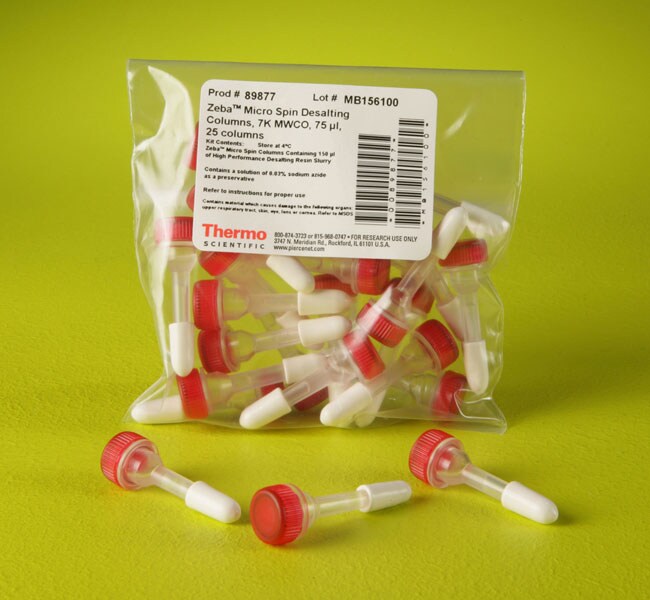Search Thermo Fisher Scientific

Thermo Scientific™
Zeba™ Spin Desalting Plates, 7K MWCO
Thermo Scientific Zeba-Spin-Entsalzungsplatten (7 K MWCO) enthalten ein Größenausschluss-Chromatographieharz mit hervorragender Proteinentsalzungsleistung in einem Zentrifugenformat für 2 µl bis 4Weitere Informationen
| Katalognummer | Menge | Format | Volumen (metrisch) |
|---|---|---|---|
| 89877 | 25 Säulen | Zentrifugationssäule | 75 μl |
| 89878 | 50 Säulen | Zentrifugationssäule | 75 μl |
| A40002469 | 5 Säulen | Zentrifugationssäule | 20 mL |
| A40002475 | 10 Säulen | Zentrifugationssäule | 20 mL |
| 89890 | 25 Säulen | Zentrifugationssäule | 2 ml |
| 89891 | 5 Säulen | Zentrifugationssäule | 5 ml |
| 89892 | 25 Säulen | Zentrifugationssäule | 5 ml |
| 89893 | 5 Säulen | Zentrifugationssäule | 10 ml |
| 89894 | 25 Säulen | Zentrifugationssäule | 10 ml |
| 89889 | 5 Säulen | Zentrifugationssäule | 2 ml |
| 89882 | 25 Säulen | Zentrifugationssäule | 0,5 ml |
| 89883 | 50 Säulen | Zentrifugationssäule | 0,5 ml |
| 89934 | 5 Säulen | Chromatographiekartusche | 1 mL |
| 89935 | 5 Säulen | Chromatographiekartusche | 5 mL |
| 89807 | 2 Platten | 96-Well-Filterplatte | 96-Well |
| 89808 | 4 Platten | 96-Well-Filterplatte | 96-Well |
Katalognummer 89877
Preis (EUR)
182,65
Online Exclusive
207,00Ersparnis 24,35 (12%)
Each
Vorrätig
Menge:
25 Säulen
Format:
Zentrifugationssäule
Volumen (metrisch):
75 μl
Preis (EUR)
182,65
Online Exclusive
207,00Ersparnis 24,35 (12%)
Each
Thermo Scientific Zeba-Spin-Entsalzungsplatten (7 K MWCO) enthalten ein Größenausschluss-Chromatographieharz mit hervorragender Proteinentsalzungsleistung in einem Zentrifugenformat für 2 µl bis 4 ml Proben.
Merkmale von Zeba Spin-Entsalzungsplatten:
• Verlustfreie Rückgewinnung—Das Harz mit geringer Bindungskapazität maximiert die Proteinrückgewinnung
• Schnell—kein Screening von Fraktionen oder Warten auf die Proteinentstehung durch Schwerkraftfluss
• Wirtschaftlich—Hohe Leistung zu geringeren Kosten als bei anderen handelsüblichen Kassetten
Zeba Entsalzungsplatten sind Polypropylen-Geräte, die einen hochleistungsfähigen Zeba-Entsalzungsharz enthalten, der eine rasche und außergewöhnliche Proteinentsalzung mit einem hohen Grad an Rückgewinnung von Proteinen, die größer als 7000 Dalton sind, ermöglichen. Mit Zeba Entsalzungsgeräten werden problemfreies Entsalzen und Pufferaustausch für Probenvolumina von 2 µl bis 4 ml möglich. Das 96-Well-Spin-Plattenformat ermöglicht eine Verarbeitung mit hohem Durchsatz.
Die Zeba 96-Well-Zeba-Spin-Entsalzungsplatten erfordern keine Dispensierung oder Hydrierung von Harz und bieten die gleiche hohe Proteinrückgewinnung wie Spin-Säulen, bei denen mindestens 95 % Salze und andere kleine Moleküle entfernt werden. Eine Platte kann 96 kleine Probenvolumina (20 bis 100 µl) in 5 Minuten verarbeiten.
Weitere Produktdaten
• Benchmarking-Experimente mit Zeba Spin Entsalzungssäulen
• Chromatographiekassetten für Entsalzung und Affinitätsreinigung
Ähnliche Produkte
Zeba™ Micro Spin-Entsalzungssäulen, 7K MWCO, 75 µl
Zeba™ Spin-Entsalzungssäulen, 7K MWCO, 0,5 ml
Zeba™ Spin-Entsalzungssäulen, 7K MWCO, 2 ml
Zeba™ Spin-Entsalzungssäulen, 7K MWCO, 5 ml
Zeba™ Spin-Entsalzungssäulen, 7K MWCO, 10 ml
Merkmale von Zeba Spin-Entsalzungsplatten:
• Verlustfreie Rückgewinnung—Das Harz mit geringer Bindungskapazität maximiert die Proteinrückgewinnung
• Schnell—kein Screening von Fraktionen oder Warten auf die Proteinentstehung durch Schwerkraftfluss
• Wirtschaftlich—Hohe Leistung zu geringeren Kosten als bei anderen handelsüblichen Kassetten
Zeba Entsalzungsplatten sind Polypropylen-Geräte, die einen hochleistungsfähigen Zeba-Entsalzungsharz enthalten, der eine rasche und außergewöhnliche Proteinentsalzung mit einem hohen Grad an Rückgewinnung von Proteinen, die größer als 7000 Dalton sind, ermöglichen. Mit Zeba Entsalzungsgeräten werden problemfreies Entsalzen und Pufferaustausch für Probenvolumina von 2 µl bis 4 ml möglich. Das 96-Well-Spin-Plattenformat ermöglicht eine Verarbeitung mit hohem Durchsatz.
Die Zeba 96-Well-Zeba-Spin-Entsalzungsplatten erfordern keine Dispensierung oder Hydrierung von Harz und bieten die gleiche hohe Proteinrückgewinnung wie Spin-Säulen, bei denen mindestens 95 % Salze und andere kleine Moleküle entfernt werden. Eine Platte kann 96 kleine Probenvolumina (20 bis 100 µl) in 5 Minuten verarbeiten.
Weitere Produktdaten
• Benchmarking-Experimente mit Zeba Spin Entsalzungssäulen
• Chromatographiekassetten für Entsalzung und Affinitätsreinigung
Ähnliche Produkte
Zeba™ Micro Spin-Entsalzungssäulen, 7K MWCO, 75 µl
Zeba™ Spin-Entsalzungssäulen, 7K MWCO, 0,5 ml
Zeba™ Spin-Entsalzungssäulen, 7K MWCO, 2 ml
Zeba™ Spin-Entsalzungssäulen, 7K MWCO, 5 ml
Zeba™ Spin-Entsalzungssäulen, 7K MWCO, 10 ml
Nur für Forschungszwecke. Nicht zur Verwendung bei diagnostischen Verfahren.
Specifications
ProdukttypSpin-Entsalzungssäule
AufreinigungszielPufferaustausch, Protein
Menge25 Säulen
Volumen (metrisch)75 μl
SäulentypProprietäres Harz für Größenausschluss
FormatZentrifugationssäule
MWCO7,0 kDa
ProduktlinieZeba™
Probenvolumen (metrisch)2 bis 12 µl
Unit SizeEach
Inhalt und Lagerung
Nach Erhalt bei 4 °C lagern.